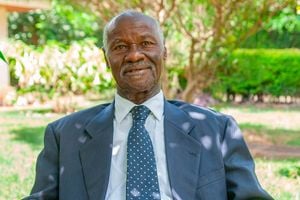
A crime scene tape at the site of the fire that killed 21 boys at Hillside Endarasha Academy.
A few years ago, almost every school had a motto that pupils in the school would swear by. One only needed to attend a sports, drama or music competition or what is known as the science congress to see the pride with which boys and girls celebrated their school motto. Schools still have these mottos nicely emblazoned on the ubiquitous school buses. They are painted on school gates. Some still appear on school badges. A school badge was once the most iconic part of the school uniform. Today, only a few footballers celebrate their club badges. The school badge is almost meaningless.
Tens of reasons will be given for the burning of school dormitories that has reemerged this month. The unfortunate death of tens of pupils at the Hillside Endarasha Academy in Nyeri is a tragedy that could have been foreseen. It could have been avoided. But our education system does not seem, ironically, to prepare learners and their educators for the unknown. How can education not endow the learner and the teacher – since learning and teaching are a symbiotic process – not predispose both to handle that which is accidental?
It is the loss of cultural identity, the values that should regulate the relationship between pupils, teachers, pupils and teachers, teachers and management, pupils and management, parents and management, parents and teachers, parents and pupils, the school and the neighbouring community, etc. Each school has some sense of its specialness. Each school, by virtue of being on its own compound, having its own teachers and pupils and management, is distinct from the next school. It has its own way of running its affairs – when pupils go to class, when they break for tea or lunch, when they participate in co-curricular activities, how they call each other, how they address their teachers, etc.
But most importantly, each school has a sense of its academic potential and what needs to be done to succeed in examinations, co-curricular activities and in life. In some old schools, this ‘sense’ is drilled into pupils when they report to school. Stories of the achievements of pupil X, Y or Z are told to the new pupils until they ‘sense’ that they belong to a special institution. In other schools, the myths of success are captured in the school campus – the names of the dormitories, the dining halls, the playgrounds, the walkways, the classrooms. In some schools, the learners felt like being at home. Indeed, in some cases, the school is home.
The school is or should be home because some learners come from very difficult conditions. They live in cramped conditions where water is scarce, there is no electricity, they can’t be guaranteed a decent meal in a day and are insecure. In (boarding) school they feel secure, they have regular meals, they have large school grounds for sports and leisure walk, they have fellow pupils for company, they have teachers to listen to their worries etc. This is more or less the ideal school. One where there is learning and teaching from different ends, whether in the classroom, on the sports field, in clubs, on field trips etc.
However, our schools have largely lost their cultural identity. Pupils leave overcrowded homes and neighbourhoods to end up in congested classrooms, dining halls and dormitories. They eat like prisoners because they have to be back in class for remedial lessons. One has to queue for a bath and to relieve oneself. Weaker pupils lose their property all the time. The pupils are always in class studying, which in many cases is really doing one exam after another. There is the school opening exam. Then midterm exam. And the end of term exam. Then there are the remedial classes during school term break.
What are schools remedying if they teach during term time? Why would learners be sitting exams three times in one term? When has what is being tested been taught? When do these learners really read just to enjoy an encounter with a theory or a fact when all that matters is passing exams? When do these learners ‘learn’ life lessons, which are probably more important than cramming facts? What ‘culture’ – school culture, community culture, country culture – is being taught to young minds that are told every morning, afternoon and evening that what matters in life is to pass end-of-school examinations?
When do teachers in these schools ever teach – where teaching is about progressively discovering certain truths and untruths of life? When do these teachers learn anything from their pupils, considering that the learners also have experiences to share about their lives? If the schools are only concerned about school performance during the national exams, how can they ever evolve a school ethos – that which allows the learners to feel that they belong to a special community of people, that they have spent their youthful time in the company of good people, that they will be productive in society, that they are themselves good people?
The obsession with passing national exams in the Kenyan school system is producing seriously alienated young women and men. These are people who have been told all their lives that if you fail in school, you fail in life; that a good certificate is the key to a good college, which leads to a good life. Ironically, even the ones who pass the exams discover after school, to their horror, that a good certificate won’t give one a good job, as Meja and Maina in Kill Me Quick by Meja Mwangi found out. These are persons who have been mentally (and in some cases physically) brutalised. In other words, the school system in Kenya is simply killing the dreams of the young too early and too quickly. There is hardly a cultural formation in our education system. We can discuss disaster preparedness and management all day, all week, the whole month; but unless we rediscover the cultural identity that made going to school a happy time and experience, we are simply groping in darkness. We owe the young people who died in the fire at Hillside Endarasha a serious conversation on and remedying the education system.
The writer teaches literature, performing arts and media at the University of Nairobi. [email protected]







